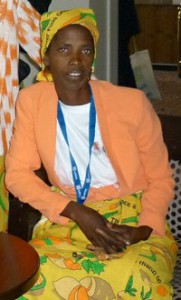(14 May 2013) Fanny Mafuli is a married mother-of-three living in Phalombe district, Malawi. She had to drop out of school for financial reasons and became a farmer. Last month she was invited to Dublin, Ireland, to attend a high level conference on Hunger, Nutrition and Climate Justice hosted by former Irish President Mary Robinson’s foundation, the Mary Robinson Foundation – Climate Justice and the Government of Ireland.
“I now have enough food, and I have increased the nutritional intake of my family, thanks to the orange-fleshed sweetpotato,” she said in the presention she gave in Chichewa, her native language, in the Irish capital. Fanny was speaking of the benefits she received from CIP’s Irish Aid-funded project ‘Rooting out Hunger in Malawi with orange-fleshed sweetpotato (OFSP)’.
While maize is the staple food in Malawi – a landlocked country with high poverty and malnutrition rates – the crop has become unreliable as the harvests have suffered from irregular rainfalls considered to be the effects of climate change. Sweetpotato is also commonly grown, but the lack of planting material has always been a constraint, particularly at the onset of the rainy season. Along with government agencies and NGO partners, CIP started the Irish Aid-funded project in 2009 in the southern region, a densely populated area.
While she was pregnant, Fanny was selected as one of the beneficiaries of subsidized vouchers to receive OFSP vines. She planted the vines during the 2010/2011 rainy season, and after harvesting the roots she became a vine multiplier. One year later she sold 1,000 four-kilogram bundles, receiving the equivalent of US$ 775 through the voucher scheme.
“I harvested enough sweetpotato to feed my family, and I also sold storage roots locally. I managed to sell 15 bags during the 2011/2012 rainy season,” she proudly explained.
 Fanny was among the 4,000 farmers who received training in vine multiplication, storage root and OFSP processing and utilization. She can now produce OFSP-based products, such as fritters, mandazi, bread, doughnut, one pot dish, a sweet beer called ‘thobwa’, and chips. “With income from sweetpotato sales, women like me are able to support families nutritionally, pay school fees, and buy school materials for our children. With profits from OFSP I have bought two goats,” she explained, “This project has changed my life.”
Fanny was among the 4,000 farmers who received training in vine multiplication, storage root and OFSP processing and utilization. She can now produce OFSP-based products, such as fritters, mandazi, bread, doughnut, one pot dish, a sweet beer called ‘thobwa’, and chips. “With income from sweetpotato sales, women like me are able to support families nutritionally, pay school fees, and buy school materials for our children. With profits from OFSP I have bought two goats,” she explained, “This project has changed my life.”
The project is an integral part of the agriculture sector wide approach (ASWAp) and Scaling up Nutrition (SUN) 1000 Special Days interventions that seeks to diversify and intensify crop production and improve land and water management in an effort to reduce vulnerability to climate change. Read more
